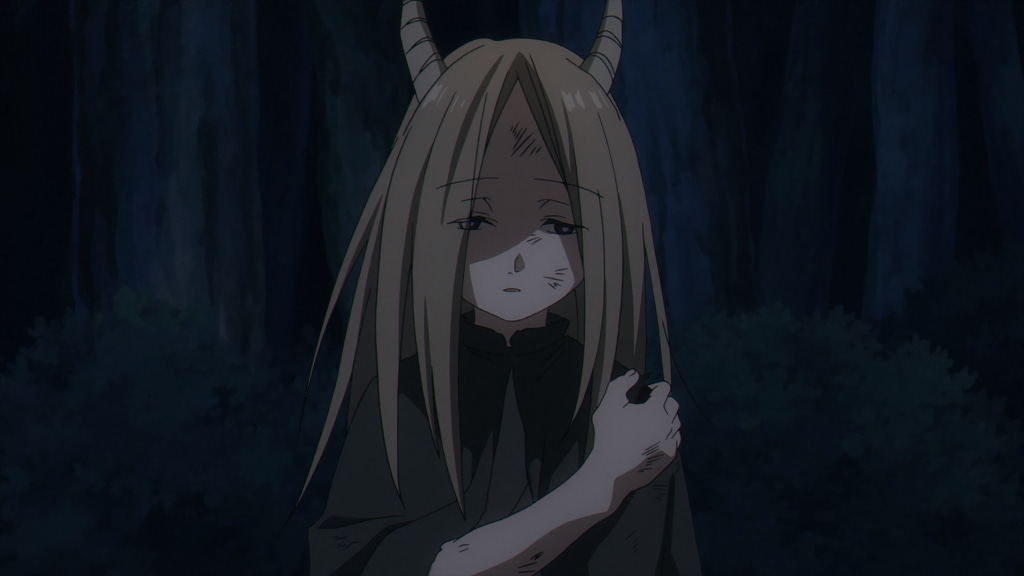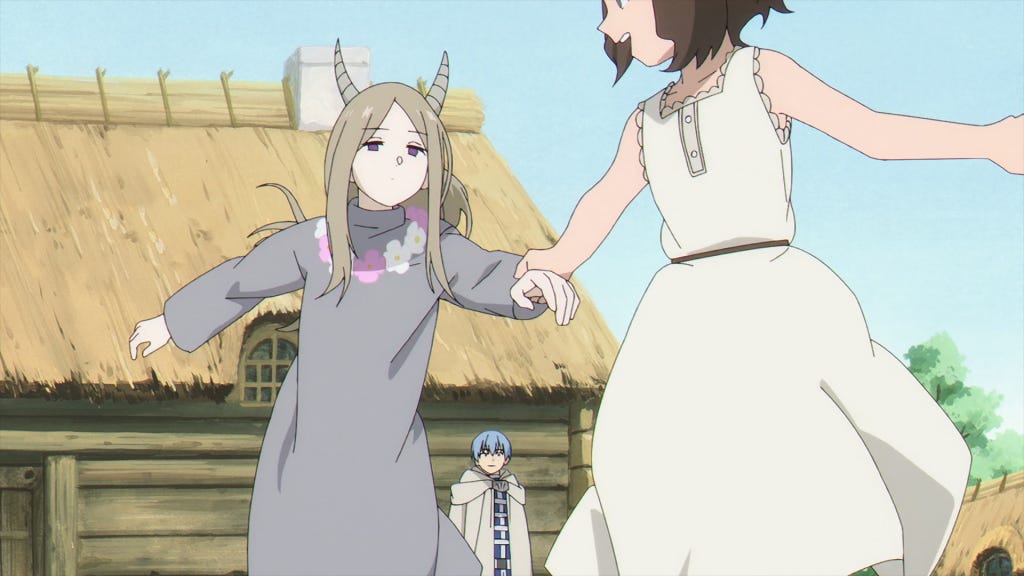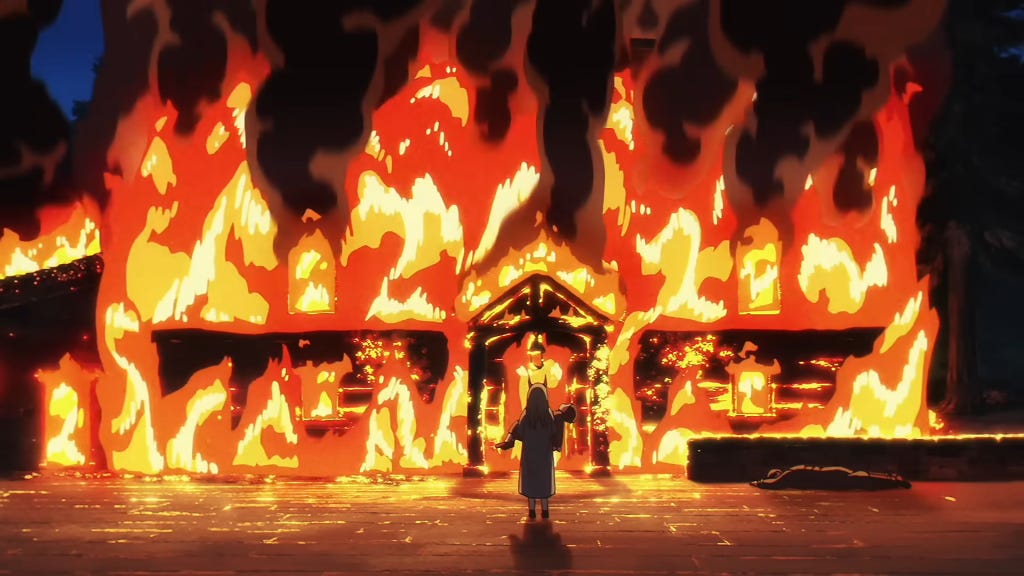Frieren Took Me By Surprise 7: Demons
I know some of you have been waiting for me to tackle this subject in particular. So let's do this!
Frieren Understands the Nature of Good and Evil
Many have written about this particular subject, and for good reason. Frieren's handling of demons is perhaps the single most interesting and groundbreaking aspect of this show.
Let's revisit that Tolkien quote one more time:
"It is the small everyday deeds of ordinary folk that keep the darkness at bay. Small acts of kindness and love."
This is absolutely true, both in real life and in the world of Frieren. Demons are a constant danger in both arenas. And they're willing to use your virtues against you.
While kindness and love are of utmost importance (and small deeds do indeed discourage evil from stepping out into broad daylight), one should never direct that love toward demons - They are irredeemable, no matter how sympathetic and human they may seem.
For tremendous insight into how modern demons of the real world work, look no further than C.S. Lewis' The Screwtape Letters.
The way I write demons is inspired by Screwtape (and, of course, The Bible). In my stories, demons are emotional walking, talking curses who get embroiled in their own petty squabbles while spreading their vices to humanity.
Irredeemability has been done before, and it's been done quite well. But it's fallen so far to the wayside in recent years that it's refreshing when it finally comes up again.

But Frieren: Beyond Journey's End builds upon these ideas and presents a newer take I've never seen before - one that fortunately never loses sight of the true nature of evil.
How Frieren Re-imagines Demons
In episode seven, Frieren's party enters the Granat Earldom in the Northern Lands. In the midst of a crowd, Frieren abruptly drops her suitcase and points her staff toward a group of kind-looking strangers.
This begins what is colloquially known as the "demon arc".
"Lady Frieren," says Fern, "we're in the middle of the city."
"There's a demon," is Frieren's only reply.
Frieren begins to cast an attack spell unprovoked, but is tackled to the ground by the city guard and placed under arrest.
It turns out these demons are here as "peace-keeping emissaries", and Earl Granat was with them, brokering peace negotiations.
But why did Frieren try to kill them immediately, no questions asked?
Since this show is so entrenched in exploring what it means to be human, demons serve as the perfect narrative counterpoint. They feel no remorse for their actions and are willing to sever the human connection, tossing it aside without a second thought. None of them are happy. They simply just "are".
While they are not the true villains of the show, they are an ever-present threat that must be dealt with whenever--and wherever--they're found, without delay.
The Legendary Mage Flamme, Frieren's former master, defined them as:
"Monsters that can speak."
An apt description.
I've written how Himmel the Hero had left behind a legacy of kindness and peace. Evil is against the ropes in this world thanks to the lasting impact of his party's heroic deeds, but that doesn't mean it's disappeared. It's mostly just hiding in the shadows, licking its wounds, rebuilding its strength and strategizing.
Demons are incapable of understanding mortals just as much as mortals are incapable of comprehending the demon's mind.
Frieren is an elf, so she thinks on an entirely different timescale than humans. But she's still able to relate to humans and other races due to a common understanding of emotion. Demons, however, lack that capability entirely.
As Frieren states, demons "merely imitate humans" and she stresses there is no negotiating with demons. She's lived a long time and has seen the true nature of these creatures. She doesn't care if the modern world suddenly cares about demons, or if it's suddenly "uncouth" to murder them in the streets. She knows they are irredeemable from hard-learned lessons.
This demon, Aura the Guillotine, has been using her undead army to attack the city day in and day out, wearing down and demoralizing its people. She is the very same one who sent the demon emissaries. Create the problem, then create the "solution". A play straight out of Saul Alinsky's playbook.
Demons in Frieren are apex predators, wolves prowling around wearing human skin. Only worse, because they don't eat for sustenance. What they do is an immutable function carried out without passion, without remorse. And their function, their whole reason for being, is to topple societies and destroy humanity. They are truly agents of the Devil.
Demons arrange themselves in a hierarchy of least powerful to most, and can't help but measure all prey based on their mana level ... and naivety.
They "prowl around the world seeking the ruin of souls", just like the St. Michael the Archangel prayer. Except instead of ruining your soul by introducing vices, they take advantage of the flaws of human nature, leveraging the sin of pride and your virtues against you, intending to build sympathy before betraying you, throwing your society into ruin.
Sound familiar? We deal with such demons on a daily basis.
It's also the same method modern propaganda uses to indoctrinate the masses. It plays on pride. It presents innocent victims and introduces guilt or peer pressure to try and get you to do or support something you normally wouldn't. It sells lies with a dose of relatable humanity.
Most humans don't get it, of course. The demons look human. They seem pleasant, and they can speak. Surely they can be reasoned with. Isn't it better to talk things out?
Himmel the Hero was sometimes too kind for his own good. He was too trusting. Too naive. He was once asked to slay this demon.
But he hesitated.
"She's still a child," he said.
A woman screamed that this demon ate her daughter.
Begrudgingly, Himmel approached, his sword drawn.
"It hurts. So much," said the demon child, her eyes feigning regret. Then she called out to her mother.
The woman who lost her daughter trembled with shock and grief as she watched this demon win over the town's sympathy.
Frieren stepped in beside Himmel, offering to do the deed herself. But the town Chief spoke up, staying her hand.
"This would make us no different than the demons."
Even knowing full well what the demon girl had done, the Chief approached her with kind eyes, wanting to give her the opportunity to atone. It seemed like he was doing the right thing. The Christian thing.
Even back then, Frieren had had a great deal of experience with these creatures. She warned Himmel that this girl was a demon, and if they spared her, they will come to regret it.
Himmel disagreed, believing the demon girl can be redeemed. But he decided they could stay in town and watch how things develop.
The Chief and his young daughter welcomed her into their home.
They cleaned her up, clothed her, treated her wounds, and fed her.
They treated her like dear family. They couldn't have been kinder toward her. Surely, she will learn their culture, learn the value of being kind, be thankful for all they're doing for her, and then she will atone for her sin through her newfound faith. Right?
Everything seemed to be going well. Himmel and the Chief thought they had been vindicated. They felt justified in sparing the demon girl. It seemed they had done the right thing.
But that very night, she murdered the village Chief and burned down their home.
Himmel was furious and filled with disbelief.
"Why did you kill the village chief?"
She simply looked back at him, smug, the Chief's daughter passed out in her arms.
When the villagers drew their weapons against her, she warned that she had a hostage.
But Himmel moved quickly, slicing off the demon's arm and rescuing the Chief's daughter.
And then, it was up to Frieren to finish it off.
The demon girl once again called out for her mother as Frieren delivered the killing blast.
As the demon crumbled to ashes, Frieren asked why she had called out for her mother. After all, demons don't have mothers.
"I mean, it stops you from killing us, doesn't it? ...It's a wonderful, almost magical word."
And so, the people of the Granat Earldom are being deceived just as that demon girl had deceived the village Chief, his daughter, and Himmel the Hero.
The entire town of Granat has been fooled. They've let demons through their city gates under the guise of "peace talks".
"To them," explained Frieren, "words are merely a means to deceive humans."
The mental state of the Granat citizens reminded me of any society's eleventh hour before its downfall.
Remember how mortals had to reverse-engineer magic from demons? They've enhanced the spells over the years, passing this knowledge down to their apprentices across the generations. If enough of that information were lost, mortals would be disarmed against demon magic. So demons have a very good reason to tear down societies, murder everyone, and burn down their villages.
No one knows this better than Frieren, because it was Flamme, her master from 1,000 years ago, who was the "progenitor of humanity's magic".
And just as mortals must actively reverse-engineer demonic magic to keep up with the magical arms race, demons reverse-engineer human language and emotion. They've discovered certain phrases contain a sort of "magic" that leave us disarmed. They've noticed it can cause us to go from cautious to trusting. They don't know why and don't care to learn. They just know these words work, and consider it a useful magic.
To them, language is a means to an end, something to be exploited to sow chaos and confusion. They'll lie to you about their tragic pasts, about losing loved ones, about how much they care about their "newborn baby". All to build up sympathy and catch you unaware.
It is important to forgive people the sins of their past and encourage a path to redemption. But we're talking about demons, here. And being kind to everyone, no matter who they are, can become a character flaw.
[Spoilers for The Lion King and The Dark Knight Returns]
Simba showed mercy to Scar only to wind up with ash in his eyes and get forced into a fight that nearly kills him.
In The Dark Knight Returns, this well-meaning celeb psychiatrist saw the "good" in Joker and managed to sway the public's opinion of him toward the positive, only to play right into Joker's plan.
Even when Joker point-blank tells the host he's going to kill everyone in this room, including the live audience, the psychiatrist stands up and runs defense, speaking on Joker's behalf.
"It's okay. He doesn't really mean that. He's just trying to ease the tension."
[End spoilers for The Lion King and The Dark Knight Returns]
When people started noticing how demons are portrayed in Frieren: Beyond Journey's End, it brewed some internet controversy. There were a lot of celeb psychiatrist-like people running defense for the demons.
A good friend of mine once told me that Frieren got demons so right, they trick people outside of the story, too.
As they say, the road to Hell is paved with good intention.
Demons create the illusion of family, of love, of human connection. But nothing is actually there. It's all staging to worm their way into human lives and destroy.
In the world of Frieren, it's a neverending circle of grief: Humans give demons chance after chance to redeem themselves, and they always prove to be exactly what they are. Those who trusted the demons are now either dead or have lost their most precious loved ones.
And for what? To try and prove a point? To try and prove that demons can be redeemed?
“Oh shut up, silly woman,” said the reptile with a grin, “You knew damn well I was a snake before you took me in.”
- from “The Snake”

























Giving a real irredeemable villain is such a huge win for this series. We've spent too long with the "Wicked" and Loki, "evil is just misunderstood" trope. We need a reminder that there is real genuine evil that cannot and should not be saved or redeemed only destroyed.
>Irredeemability has been done before, and it's been done quite well. But it's fallen so far to the wayside in recent years that it's refreshing when it finally comes up again.
Anime is very guilty of having "sympathetic" monster races/demons. All over the place I see it, and have watched passable shows where this is the sort of messaging. Maybe the "demon" bit is a slight mistranslation, but it's one that wounds badly when watching generic-fantasy-show-###. I'm sorry, I'm not into fantasy for hippy-dippy pastoral harems where if only everyone sang "Kumbaya" all wars would cease and the Garden restored. I'm in it for the action-adventure-romances. The battles. The clever use of magic and wit. Saving of princesses and the valiant last stands against armies of the night.
>Himmel the Hero was sometimes too kind for his own good. He was too trusting. Too naive. He was once asked to slay this demon. <image>But he hesitated.
There was a long con in this arc. This demon fooled me, in so far as my gut reaction warred with what I legitimately didn't yet known. Was there other variables in play? I was under the impression it was maybe a week or so before the demon committed it's atrocity against the mayor. But in either case... they were tricked, and it resulted in more deaths.
The con in the arc deals with a very human thing. Can we trust what received wisdom we have inherited... or could it be flawed in some fashion? As it turns out, the dogma is correct. Demons are to be killed whenever found, if possible.